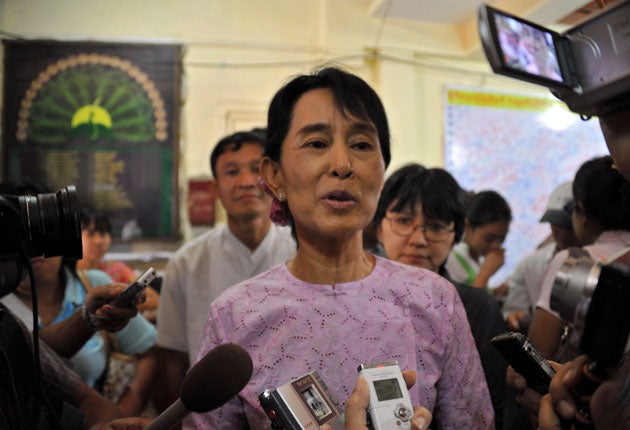Burma benefits as UK targets aid money on fight for democracy

Your support helps us to tell the story
This election is still a dead heat, according to most polls. In a fight with such wafer-thin margins, we need reporters on the ground talking to the people Trump and Harris are courting. Your support allows us to keep sending journalists to the story.
The Independent is trusted by 27 million Americans from across the entire political spectrum every month. Unlike many other quality news outlets, we choose not to lock you out of our reporting and analysis with paywalls. But quality journalism must still be paid for.
Help us keep bring these critical stories to light. Your support makes all the difference.
British aid to Burma – the poorest country in South-east Asia – is to be sharply increased in an effort to help the country's most beleaguered and to support the struggle for democracy.
A review carried out at the behest of Andrew Mitchell, the international development secretary, has concluded the £32m currently spent in Burma should increase to a total of £185m over the next four years. Officials say the money will target grass roots organisations and other partners working there and not to the military junta.
"Britain has not forgotten the people of Burma, who have been silenced for too long. They have suffered under decades of dreadful economic mismanagement and human rights abuses as well as the ongoing threat of civil war and famine," Mr Mitchell said in a statement. "The poorest in Burma must have a voice. We will build up civil society, local charities, village groups and their representatives to push for change."
While the Coalition says the total budget for international aid budget is to be increased by 37 per cent in real terms, Mr Mitchell said last summer that he believed the money needed to be targeted more effectively. It is expected that the aid budgets to many countries will be sharply reduced or scrapped. India, a country where the economy is growing by more than 8 per cent and where Britain currently annually spends £280m, is one of those places where some believe aid should be halted. In contrast, the minister announced earlier this month that aid to Somalia is to be tripled, from £26m in 2010-11 to £80m in 2013-14.
The review, the full results of which are expected to be announced later this month or in early March, found that in Burma at least 16 million people live in desperate hardship. The junta, which recently oversaw controversial elections for a largely toothless parliament, spends just a tiny amount on services healthcare and education.
Officials said DFID will work with a growing number of community groups and aid organisations working "to promote a peaceful and democratic future for Burma from the bottom up" to try to address some of this shortfall. In particular, money will be targeted towards improving maternal health and reducing the threat of malaria, estimated to affect more than 8 million Burmese. In addition, they believe the money will support 225,000 children through primary school, help increase food production for 200,000 people and provide micro-finance to another 100,000. Money lenders in the country currently charge interest rates of up to 200 per cent.
The increased funding has been welcomed by campaign groups, which had been urging the department not to cut back on spending. They said, however, Britain could do more. "We would also like to see them be more creative in ensuring aid reaches the most needy, and not just channel large grants through UN agencies which face restrictions on their operations, especially in ethnic [minority] areas," said Mark Farmaner of Burma Campaign UK. "DFID should significantly expand democracy promotion work via groups in exile which manage underground networks, as well as civil society in country, as there are strict limitations on what can be done in country."
* The Australian publisher of an English-language newspaper in Burma has been arrested in what an associate suggested was a business dispute. The Myanmar Times editor-in-chief, Ross Dunkley, was in Rangoon's Insein jail on charges of violating a section of the immigration law on overstaying a visa. The associate said his arrest coincided with "tense negotiations" with his Burmese business partners.
British aid in numbers
£32m Current British bilateral aid to Burma
£185m Intended aid to Burma over next four years
£8.7bn Total UK overseas aid budget this year, set to rise to £12.6bn by 2014
42% Share of aid sent to Burma spent on healthcare
$5 The total international aid spend on Burma per capita
$37m US government's intended spend this year
Subscribe to Independent Premium to bookmark this article
Want to bookmark your favourite articles and stories to read or reference later? Start your Independent Premium subscription today.
Join our commenting forum
Join thought-provoking conversations, follow other Independent readers and see their replies
Comments